
The beginnings of Italian Fascism. Created by Sal Khan
- Subject:
- History
- Material Type:
- Lesson
- Provider:
- Khan Academy
- Provider Set:
- Khan Academy
- Author:
- Sal Khan
- Date Added:
- 07/26/2021

The beginnings of Italian Fascism. Created by Sal Khan
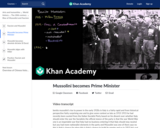
The beginnings of Italian Fascism. Created by Sal Khan

The beginnings of Italian Fascism. Created by Sal Khan

By exploring myths and truths surrounding Independence Day, students think critically about commonly believed stories regarding the beginning of the Revolutionary War and the Independence Day holiday.

A selection of Library of Congress primary sources exploring the history and civil rights legacy of the NAACP. This set also includes a Teacher s Guide with historical context and teaching suggestions.
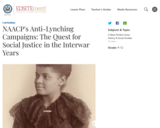
The NAACP fights to establish anti-lynching laws in the years between the World Wars
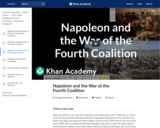
Napoleon takes on Prussia and Russia and wins again. Created by Sal Khan.
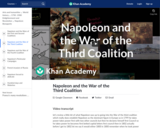
Napoleon leads France to become the dominant power in Europe. Napoleon I becomes Emperor of France. Created by Sal Khan.
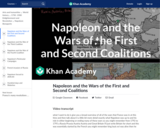
Overview of the first two coalitions against France and Napoleon's roles in them. Created by Sal Khan.
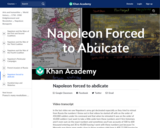
Napoleon was forced to abdicate in April 1814 after his unsuccessful invasion of Russia resulted in a broad European alliance against him. In the Treaty of Fontainebleau, Napoleon abdicated the throne and renounced his heirs' claim to any future throne in France. He was then exiled to the island of Elba off the coast of Italy. . Created by Sal Khan.

French forces get embroiled in the Iberian Peninsula. Created by Sal Khan.
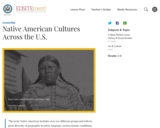
This lesson discusses the differences between common representations of Native Americans within the U.S. and a more differentiated view of historical and contemporary cultures of five American Indian tribes living in different geographical areas. Students will learn about customs and traditions such as housing, agriculture, and ceremonial dress for the Tlingit, Dinè, Lakota, Muscogee, and Iroquois peoples.
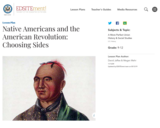
Native American groups had to choose the loyalist or patriot cause"”or somehow maintain a neutral stance during the Revolutionary War. Students will analyze maps, treaties, congressional records, first-hand accounts, and correspondence to determine the different roles assumed by Native Americans in the American Revolution and understand why the various groups formed the alliances they did.
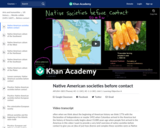
What was life like in North America before Europeans arrived? In this video, Kim explores how different environmental factors in North America shaped a variety of Native American societies.

This lesson unit provides an insight into the navigational methods of the Bronze Age Mediterranean peoples. The students explore the link between history and astronomical knowledge. Besides an overview of ancient seafaring in the Mediterranean, the students use activities to explore early navigational skills using the stars and constellations and their apparent nightly movement across the sky. In the course of the activities, they become familiar with the stellar constellations and how they are distributed across the northern and southern sky.

The beginnings of Nazism. Created by Sal Khan

This collection uses primary sources to explore Negro League Baseball. Digital Public Library of America Primary Source Sets are designed to help students develop their critical thinking skills and draw diverse material from libraries, archives, and museums across the United States. Each set includes an overview, ten to fifteen primary sources, links to related resources, and a teaching guide. These sets were created and reviewed by the teachers on the DPLA's Education Advisory Committee.

After more than 30 years in prison and an historic election that for the first time in the nation's history included all citizens regardless of race, Nelson Rolihlahla Mandela became President of the Republic of South Africa on May 10, 1994. This Teacher's Guide includes resources for teaching about the brutality of apartheid, the resilience of the nation's people, the leadership of Nelson Mandela, and primary source materials that will inform discussion about the country's emergence in the world.

A discussion of how the relative influence of Confucianism, Taoism and Buddhism has changed from the Han through the Tang and Song dynasties. Overview of Neo-Confucians, including Zhu Xi.
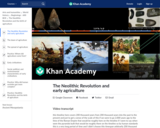
How, why, and when did agriculture first emerge, and what were its implications on human society? Sal explains in an overview.